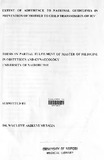| dc.contributor.author | Musalia, Wycliffe A | |
| dc.date.accessioned | 2013-06-11T08:25:38Z | |
| dc.date.issued | 2010 | |
| dc.identifier.citation | Degree of Master of Medicine in Obstetrics and Gynaecology | en |
| dc.identifier.uri | http://erepository.uonbi.ac.ke:8080/xmlui/handle/11295/31257 | |
| dc.description | Thesis in partial fulfillment of Master of Medicine
In Obstetrics and Gynaecology
University of Nairobi 2010 | en |
| dc.description.abstract | Mother-to-child transmission [MTCT] of HIV-virus contributes to over
90% of the paediatric HIV infections. Approximately 50% of this vertical transmission
occurs during labour and delivery. The national guidelines for PMTCT make
recommendations for specific interventions so as to reduce perinatal transmission. Data
on adherence to the guidelines by caregivers and quality of PMTCT care is however'
limited.
To evaluate the extent to which PMTCT care offered to HIV positive
women admitted for delivery at KNH and PMH adheres to National Guidelines in order
to reduce vertical transmission of HIV during labour and delivery.
Cross-sectional survey.
The labour ward at Kenyatta National Hospital and Pumwani Maternity
Hospital.
All consenting HIV positive women admitted to the labour wards at
KNH and PMH and planned for delivery.
Study period: Mid January to mid April 2009
Data was obtained through observation of care given, direct
interviews, and by perusal of clinical records. These information was entered into a
structured questionnaire. Data was analysed using SPSS software.
Extent to which PMTCT interventions are offered and level
of adherence to the National Guidelines.
A total of 370 HIV -positive women were recruited into the study, of whom two
hundred and sixty six were from Pumwani Maternity Hospital and one hundred and four
were enrolled at Kenyatta National Hospital. Three hundred and fifty seven [96.4%] of
them had been counselled on vertical transmission and while two hundred and five
[55.4%] of them had HIV disease staging by CD4 cell count. There were no significant
differencesbetween the two study sites in the extent of counselling on MTCT (p=0.398)
and HIVdisease staging by CD4 testing (p=0.28). Three hundred and forty nine [94.3%]
of themwere offered varied ARV regimens for PMTCT of whom 101[27.3%] were on
HAART.A total of 94 women were given single dose nevirapine and use of efficacious
combination prophylaxis was limited. Overall two hundred and sixty eight women [73%]
had spontaneous vertex delivery. An episiotomy rate of 7% was observed and no vacuum
deliverywas recorded. A caesarean section rate of 27.6% was recorded with PMTCT as
an indication in almost half of the cases. Significantly more women delivered at KNH
wereoffered HAART (p<O.OOl) and elective caesarean delivery (p<O.OOl ).
A great majority of HIV positive women admitted for delivery received
counselingon vertical transmission. HIV disease staging was however not done routinely
and use of HAART and efficacious combination ARV prophylaxis was limited. Although
effortsto comply with the recommendation for modified intrapartum care were noted at
both facilities, optimization of interventions for PMTCT is significantly more at KNH
than at PMH. | en |
| dc.language.iso | en | en |
| dc.title | Extent of adherence to national guidelines in prevention of mother to child transmission of HIV | en |
| dc.type | Thesis | en |
| dc.description.department | a
Department of Psychiatry, University of Nairobi, ; bDepartment of Mental Health, School of Medicine,
Moi University, Eldoret, Kenya | |
| local.publisher | Department of Obstetrics and Gynaecology | en |

